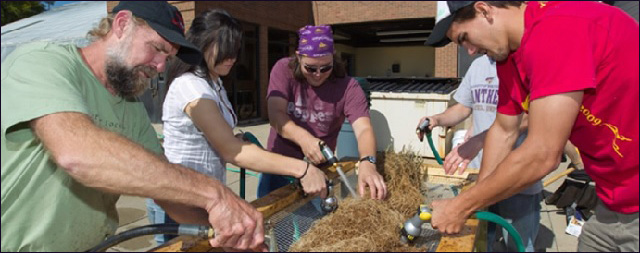
Undergraduate Student Work
Work/Availability
Open Access Undergraduate Student Work
Type of Work
Poster Presentation
Keywords
Butterflies--Habitat--Iowa; Prairie plants--Iowa; Plant species diversity--Iowa;
Abstract
The conversion of native Midwestern tallgrass prairie to monoculture production of corn (Zea mays) and soybeans (Glycene max) for food and fuel has resulted in a significant decrease in habitat for insect pollinators, including butterflies. Compared to conventional biofuels such as corn ethanol, prairie biomass produces greater energy yields while providing high quality wildlife habitat and protecting soil and water resources. My research took place at Cedar River Natural Resource Area in Black Hawk County Iowa, USA. In spring 2009, the University of Northern Iowa’s Tallgrass Prairie Center seeded 48 research plots in conventional fields to one of four experimental treatments of native vegetation: 1) switchgrass monoculture, 2) warm-season grass mix (5 species), 3) biomass mix (8 forb and 8 grass species), or 4) prairie mix (20 forb, 3 sedge, and 9 grass species). During the summers of 2010, 2011, and 2012, our team conducted visual surveys of butterflies (class Lepidoptera), a group widely recognized as bioindicators of ecosystem health. I used these data to compare butterfly abundance, species richness, and composition among treatments over the three year study. I hypothesized that butterfly abundance and richness would increase over the three year period and that more diverse plantings would support a greater abundance and diversity of butterflies. Our results indicate that butterfly abundance and richness fluctuated depending on site management. This year, butterfly abundance started out high and remained high in biomass and prairie plots but decreased in grass plots, whereas richness started out high and decreased over the three survey periods. The conversion of marginal agricultural lands to areas of natural vegetation cultivated for biofuel production would be beneficial to increase abundance of butterflies through creation of habitat and providing host plant and nectar resources.
Date of Work
2012
Department
Department of Biology
Department
Tallgrass Prairie Center
First Advisor
Mark C. Myers
Repository
UNI ScholarWorks, Rod Library, University of Northern Iowa
Copyright
©2010 Nicholas E TeBockhorst, Jarrett D Pfrimmer, Dr. Mark C Myers
Language
en
File Format
application/pdf
Recommended Citation
TeBockhorst, Nicholas E.; Pfrimmer, Jarrett D.; and Myers, Mark C., "Butterfly Community Dynamics in a Restored Prairie Used for Biofuel Production" (2012). Undergraduate Student Work. 30.
https://scholarworks.uni.edu/ugswork/30


